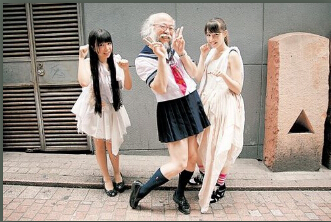(单词翻译:单击)

From the neck up, Hideaki Kobayashi is a middle-aged, bald man with a bushy mustache.
只看脖子以上的话,小林秀章是个一把胡子的光头中年大叔。
From the neck down, this Japanese man could pass for a Japanese schoolgirl as he parades all over Tokyo dressed in "Seifuku," the name for the sailor outfits worn by teenage girls.
但脖子以下,这位日本大叔看上去就跟日本女子中学生一样,他穿着“水手服”(女学生所穿的水手服装)走遍东京的大街小巷。
The 50-something Kobayashi started dressing up as a teenage girl about three years ago. Before that, he was a computer engineer and an accomplished photographer — careers that he's kept alive.
小林今年50多岁了,大约三年前,他开始把自己打扮成女子中学生的样子。在这之前,他是一名电脑工程师,同时也是一位颇有造诣的摄影师,但这两项事业他现在也都没有放弃。
He made his debut at an art and design event, but joked about the reasons behind his decision to dress like a giddy schoolgirl.
他首次露面是在一个艺术设计展上,在谈到决定穿女装的原因时他开了个玩笑。
"That's a difficult question," Kobayashi told Kotaku.com last year. "It's not really something I've thought too deeply about. Hrm. I guess it's because sailor suits look good on me?"
“这个问题蛮难回答的,”小林在去年接受Kotaku.com网站采访时说,“我对这件事想得其实不是很深刻。呃,我想也许是因为我穿上水手服很好看?”
As he's become more comfortable in his own skin -- and the schoolgirl skirts -- Kobayashi has become more direct about his intentions.
随着他越来越适应穿水手服的自己,小林回答这一问题时变得更为坦率。
"Japan society is all about conforming to the other people," Kobayashi told CNN. "I just want to wear something cute."
小林对CNN说,“日本社会十分注重对他人的迎合。我只是想穿得可爱一点。”
Kobayashi is attracted to women, and identifies as a man even when he's challenging gender norms.
小林非常受到女性的欢迎,即使他挑战性别规范,人们也认同他是一位男性。
He's proud that he's sought out by young girls who want to take pictures with him and post them online, Oddity Central reports.
Oddity Central报道说,他很得意经常有年轻的女孩子希望跟他合照并把合照放到网上。
Kobayashi's reputation has spread so far that one Japanese prep school has hired him to teach teenagers to think for themselves.
小林的名声很响,日本的一座大学预科学院甚至聘请他来教学生们如何进行独立思考。
But while men dressing as women is accepted in Japanese pop culture, Kobayashi says that real life reactions can be different -- he says sometimes people shout insults on the street, and notes that he's been stopped by the police as many as ten times.
虽然男扮女装在日本是一种可接受的流行文化,小林表示在真实生活中,人们的反应还是会不一样,有时人们会在大街上大声侮辱他,而且他还经常被警察拦住,足有10次之多。
Despite the negative attention and discrimination, he thinks it's worth it. It's still outweighed by the positivity of the throngs of people eagerly posing with him as he skips from Shibuya to Harajuku, and by the kids he's able to reach with his message of tolerance, and how liberating being a non-conformist can be.
即使有负面评价和歧视,他认为他还是值得这么做。他从涩谷一路走到原宿会不断有人想要与他合照,他可以教孩子们什么是宽容,以及作为一个不拘一格的人感觉是如何的自由,这些所带来的正能量更为重要。
"If there's something you want to do, do that," Kobayashi said. "That's my message. Be yourself."
“如果你想要做什么事,就放手去做,”小林说,“这就是我想要传递的讯息。做真正的自己。”


